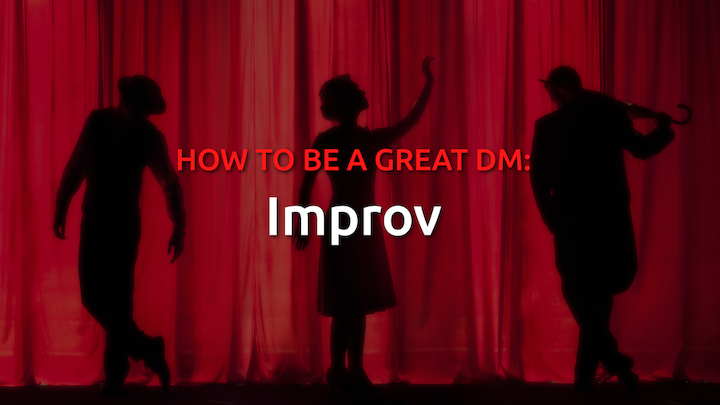Great DMing: Improv
Go with the story
Improv is the art of making things up on the fly. There’s a misconception that because you have to be ready to create new things as you go along that you don’t have to do any planning or practice. False.
Improv is not a lack of planning. Improv is the ability to change the plan without anyone noticing. But you have to have a plan to change.
So I’m going to tell you how to come up with a plan that you can change at a moment’s notice and how to be flexible enough to change your plan. You can do this through character planning, emergency planning and being flexible.
Character planning
Some of the characters you will create can be planned out ahead of time in broad strokes. But it’s next to impossible to know everything each character will need to say before you get to the table. That’s where improv steps up and takes center stage.
Eventually, your players are going to do something wild your NPC didn’t see coming. Like punching a dog or stealing someone’s glass eye. I plan for character improv by making one distinct goal for each NPC. To say it another way, I figure out what that NPC wants. What drives him or her.
And then I simply follow what the NPC wants.
For example, the blacksmith wants to get paid for his work, the barmaid wants to get done cleaning the bar for the night, the regent wants the hostilities with his neighboring kingdom to end, the princess wants revenge on her sister for stealing her favorite horse. If what the players do or say might help that, then it’s possible that the NPC will go along with it.
If you get stumped on what to do, have the players make a skill check to convince the NPC to help you. It can buy you valuable stall time and maybe even lead to rolling a 1, which always ends in laughs.
So with character planning, all you need to remember is this: give every NPC a want. As long as you know what the NPC wants, you can improv your reactions to unexpected PC choices.
Emergency planning
The most important thing is - don’t panic.
Emergency planning is exactly that - it’s planning for the unexpected. I don’t mean that you write down every possible “bad” thing that could happen. You don’t need a list. In fact, a list might hold you back because your players will inevitably choose something that isn’t on it.
Emergency planning is simply planning for what steps to take when the game gets, well, weird.
Here’s an example of what I mean. Say your players decide that instead of following up on the obvious villain mentioned frequently by tavern inhabitants, that they will track down the abusive partner of one of the barmaids. Now, maybe you didn’t even write that NPC. Maybe that barmaid’s backstory was simply misinterpreted by your party or maybe you didn’t realize that tracking down abusive jerks was a lot more attractive in the moment than facing off against a major villain.
So what do you do?
First, you stall for time by asking the party to roll for perception. Next, you come up with a want for the abusive partner NPC. Because you already know to include a strong want in each of your NPCs, you will be prepared for this unexpected development. Then, the NPC’s want will tell you where that character might be in the town/location, which you can hint to the players when they finish their perception rolls.
At this point you have a who and a where, which is about the amount of info that the players need to move forward with the story. Now you can just move with the players as they make their way to your new NPC.
Here’s how emergency planning allows you to improv in steps:
Stall for time - with rolls or other strategies
Use your existing NPC creation strategy - giving the NPC a want
Utilize your existing area - you already have a map, so make it count
This last one might need some extra explanation. I’m assuming that during your campaign planning you created a vibrant location or multiple locations to support your campaign. Instead of reinventing the wheel, lean into your existing location. Pick a place on your existing map to direct your players. That way you don’t have to add to your improv stress or sacrifice your sanity to deliver a rich environment for your PCs.
Follow these three steps whenever you run into an emergency, and your improv-ing skills will be legendary.
Oh, and don’t panic.
Be flexible
Improv is all about letting go and being flexible. The first thing you gotta accept is that despite the name dungeon master, you are not the sole owner of the story you are telling. No, you are the guide that helps players navigate the story you are all collaboratively telling.
You are not the sole owner of this story.
You are merely the leader.
And the one responsible if the story goes badly.
To summarize, you don’t have full creative control, but you do have full responsibility.
That sounds like a raw deal. It sounds like you’re gonna get screwed somehow. I suppose if the goal of a DnD campaign was to tell the greatest story ever written, then you would be in trouble. It is unlikely that a committee will be able to craft that level of story. The great thing for you is that the goal is not quite as lofty (or debatable).
The goal of any DnD campaign is the enjoyment of the players.
Do the players (all of them) mostly enjoy the story? Do they want to keep playing? Would they play with you as the DM again on a different campaign? Do they go home happy at the end of the evening?
You’re aiming for yes to all of these. If you focus on that goal of yes, being flexible is much easier.
Why?
Being a great DM is admitting that the story, the campaign and the experience is NOT about YOU. It is about the players. The players are the reason you are here (not that you can’t have fun, too, you can).
When you keep the players at the forefront of your mind, you will find yourself bending the story for their benefit. This is at the heart of all good improv - the knowledge that the improv is not all about you. This knowledge leads us to the first and central commandment of improv:
ALWAYS ACCEPT, NEVER DENY.
Essentially, say yes to other people’s ideas. Let go of your need to be the funniest, cleverest, most brilliant or whatever. Accept that other people have good ideas, too, and they are worth exploring.
Or, maybe even harder, accept that sometimes other people have bad ideas, but the players like those bad ideas better than the good ones you presented.
Be flexible. Being a good DM is letting go and making the game about the players. If you can do this, you can be good at improv.
Last thoughts
Improv will help you keep on the ball when players do something wonky. Being good at improv often involves planning, and always involves flexibility. If you want to be a great DM, you’ll always remember that the players’ enjoyment comes first, not your own aspirations of grandeur.
Also, don’t panic. Never panic. There is always a better option.
Like excessive root beer drinking and madness.
Remember, all the organization in the world is helpful. But with a DnD campaign, chaos is likely.
#NumberOneJosiah
Jo is our co-founder, resident DM for Hire and a philosopher of tabletop gaming.
Jessie CM
Jessie is our marketing guru, lover of #NumberOneJosiah and a published author.
Check out some of our Featured blogs!














Kickstarter is a crowded place, so to launch a successful campaign it’s important to know what you will need ahead of time. Specifically, what you're selling, how to make it look fancy, and making certain you know your numbers.